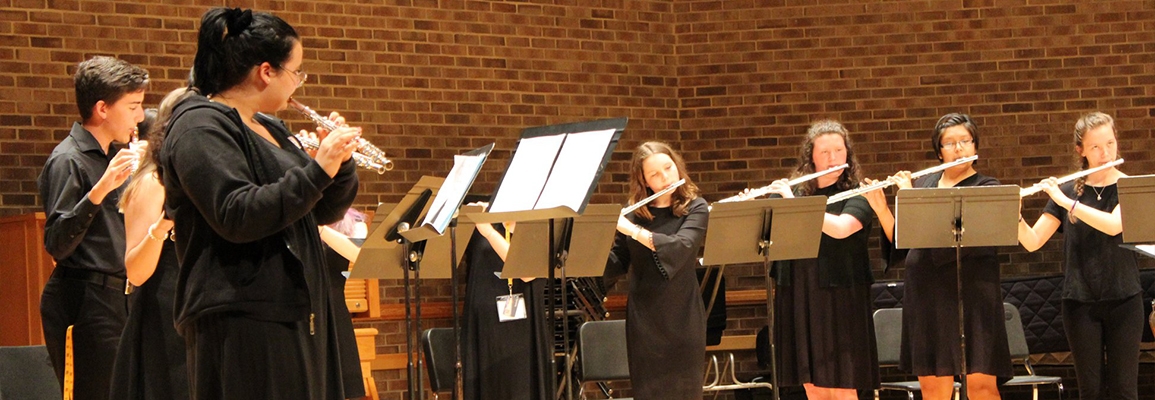Flute
- Scales: All major scales and arpeggios (2 octaves); Chromatic Scale (3 octaves)
- Solo Literature: contrasting movements from any standard flute solo: e.g., Telemann, Handel, Bach, Poulenc, Hindemith, Bloch, or Concertos of Mozart, would be appropriate.
- Sight Reading: a short sight-reading excerpt will be given.
Oboe
Grades 8-10
- Major scales, C major through 3 flats and 3 sharps; minor scales through 2 flats and 2 sharps.
- A solo from Jay Arnold's Everyone's Favorites:
- Handel, "Sonata No. 1," 1st movement
- Ceasar Cui, "Orientale," Op. 50
- Be prepared to sight-read at CMC Ensemble Placement Audition.
Grades 11-12
- Major scales, C major through 5 flats and 5 sharps; minor scales through 3 flats and 3 sharps.
- A solo from Jay Arnold's Everyone's Favorites:
- Telemann, "Concerto in F minor," 1st movement
- Mozart "Sonata," K. 370, 1st movement up through measure 63.
- Be prepared to sight-read at CMC Ensemble Placement Audition.
Clarinet & Bass Clarinet
- Major scales, up to 4 flats and 4 sharps, at least two octaves; full-range chromatic scale.
- An etude or solo excerpt that demonstrates both lyrical and technical abilities.
- Students wishing to be considered for Orchestra or the Honors Woodwind Quintet should prepare a solo piece.
- Sight-Reading as requested.
If you play Contra Clarinet, you should bring your Bb Clarinet, this will ensure you can participate in enough performances, not all pieces require Contra, and it is not used in Orchestra. We rent instruments, contact the office for information on renting prior to camp.
Bassoon
- Minimum Scale Requirements: All major scales and a 3-octave Bb chromatic scale.
- Minimum Solo Requirements: select from your state's All-State or All-District solo list OR select two contrasting movements from any sonata by J. E.Galliard.
- Be prepared to sight-read at CMC Ensemble Placement Audition (knowledge of tenor clef is required for placement in the CMC orchestra).
Saxophone
- Major Scales with Arpeggios (2 octaves where possible)
- Full-range Chromatic Scale
- An etude or solo excerpt that demonstrates both your lyrical and technical abilities.
- An etude excerpt will be presented for sight-reading purposes.
- Any student wishing to audition for placement in a jazz band will need to play a short jazz prepared piece, and sight-read a jazz etude. If you do not have a prepared jazz piece, the sight-reading will suffice.
Etude books to consider include The Ferling 48 Studies, the Marcel Mule etudes, Selected Studies by Voxman, or Rubank Advanced Method, Volume 2.
Solos to consider include works by Eccles, Creston, Lunde, Heiden, Handel, Ibert, Bozza, Teal, Fasch, Glazounov, Schmidt, Absil, or comparable works.
The scale portion of each audition should take no more than 3 minutes. If the student can play all 12 in 3 minutes they are welcome to do so.
